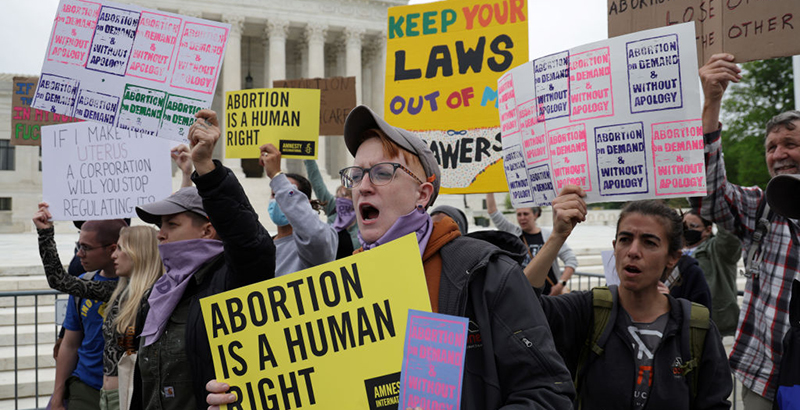Half of States Set to Ban Abortion Have No Sex Ed Requirements

Get stories like these delivered straight to your inbox. Sign up for The 74 Newsletter
Should the Supreme Court strike down Roe v. Wade, 26 states are set to ban abortion, according to a 2021 analysis by the Guttmacher Institute, a nonpartisan reproductive health research group.
Exactly half have no mandate that schools teach sex education, data from the Institute reveals, and only four of the 26 require curricula to cover the topic of contraception. Twenty-three allow districts to skip over consent entirely.
Restricting abortion access in a country that already limits young people’s resources for learning about sexual health is “a horrifying picture,” said Cassandra Corrado, a sex educator who works with high school and college students in Florida, where an abortion ban now is expected.
“We’re going to have a lot of people being afraid of their own bodies and we’re going to have a lot of people turning to unreliable sources of information,” she told The 74.
Teens who receive comprehensive sex education are significantly less likely to have unwanted pregnancies than those who don’t get lessons on the topic or receive abstinence-only teachings, studies show. The five states with the highest rates of teen pregnancy — Mississippi, Arkansas, Louisiana, Oklahoma and Alabama — are also among those set to outlaw abortion if Roe is overturned.
Nationwide, only 29 states and Washington, D.C. require public school students to receive any form of sex education and just 18 require such teachings to be medically accurate.
With the map of U.S. sex ed laws patchy at best, a leaked draft majority opinion published by Politico on Monday evening revealed that the Supreme Court appears poised to reverse the 1973 Roe decision, which guarantees federal constitutional protection of abortion rights. Chief Justice John Roberts confirmed Tuesday that the draft is authentic.
“Roe was egregiously wrong from the start,” writes Justice Samuel Alito on behalf of the majority. “It is time to heed the Constitution and return the issue of abortion to the people’s elected representatives.”
If the 50-year-old ruling falls, 22 states have laws that will immediately take effect outlawing abortion, including trigger bans and clauses in their state constitutions. Analysts expect four more to ban the procedures legislatively.
Matisse Laufgraben is a rising sophomore at Indiana University Bloomington where she works as student leader promoting sexual well-being on campus with the organization Culture of Care. Attending school in a state that has enacted 55 abortion restrictions and bans in the past decade, paving the way for a comprehensive ban should Roe be struck down, she’s hyper-aware of the fallout for her and her peers.
“If you get pregnant, you [will] have to deal with the consequences. There’s no escape,” she told The 74. “It takes away that freedom for women.”
Despite Laufgraben’s work to inform peers about consent and healthy relationships, there’s still a “scary amount of sexual assault cases and sexual violence” on campus, she said. The prospect of abortion access rolling back in her state amplifies such fears, she explained, especially for female-identifying students who are more likely to be assault victims.
“It feels like we don’t have control over what happens to our bodies. … We don’t have control over whether or not we get sexually assaulted. And then we don’t have control over whether or not we want to have the baby,” said the college student. “It really just feels like everything is turned against us.”
The state abortion bans have an inverse relationship with rules requiring comprehensive sex ed. Of the 26 states expected to enact abortion bans in the coming months, only Iowa, Tennessee and Utah mandate sexual education in school and require that lessons be medically accurate. South Carolina is the sole state among the 26 that orders schools teach sex education and also requires lessons on consent.
Meanwhile, 238 anti-LGBTQ bills were filed in U.S. statehouses during the first three months of 2022, including “Don’t Say Gay” laws and bans on trans-related books in school. Many of the laws would bar educators from discussing or providing students with materials involving sexual orientation and gender identity, according to the American Civil Liberties Union.
“It’s not a coincidence that … state abortion restrictions are getting tighter at the same time as we’re seeing more restrictions on sex education, more restrictions on trans youth and how they can engage in schools,” said Corrado.
With laws stipulating what schools staff can and can’t discuss in Florida classrooms, many of her colleagues have to walk a “fine line,” she said, in order to deliver the information that youth — especially those who identify as queer, trans or nonbinary — need for their sexual well-being.
“As sex educators, one of the conversations that we’re having all the time right now is ‘How can we … protect our careers and also still be giving people the information that they need,’ ” said Corrado.
Even though schools in her state legally must provide lessons on sex education, she said, they often give students an incomplete or even false picture. According to state law, curricula need not be medically accurate, may promote religion and must stress the importance of abstinence.
“We shouldn’t assume that students are getting [accurate] information in schools right now, because they might not be,” said Corrado.
Get stories like these delivered straight to your inbox. Sign up for The 74 Newsletter

;)
